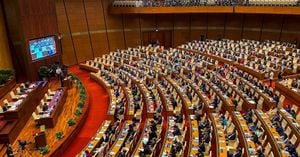On January 20, 2025, Donald Trump was sworn in as the 47th President of the United States, stepping back onto the political stage with several swift and polarizing moves. Among his initial executive actions, Trump lifted sanctions imposed on over 30 Israeli settler groups and entities, previously enacted by the Biden administration. This decision stirred intensive debate about its impact on the Israel-Palestine conflict, especially amid increasing settler violence against Palestinians, which had escalated during the recent war on Gaza.
The lifting of sanctions was particularly celebrated by far-right Israeli officials. The sanctions, which had blocked individuals and entities from accessing U.S. property and financial systems, were seen as part of attempts by the U.S. to moderate Israel's actions against Palestinians. Many of the targeted organizations had faced scrutiny for their involvement with extremist settler activities, including the Amana organization and individuals with histories of violence against Palestinians.
“The sanctions were a severe and blatant foreign intervention in Israel’s internal affairs,” said Bezalel Smotrich, Israel’s Finance Minister, expressing gratitude for Trump’s action on social media. His sentiments were echoed by Itamar Ben-Gvir, the former National Security Minister, who welcomed Trump’s decision as historic. Such reactions highlight the growing polarization and criticism within the Israeli government concerning U.S. foreign policy.
During his inaugural address, Trump invoked historical figures such as William McKinley to frame his vision for America. He praised McKinley for his economic policies and territorial acquisitions, indicating his desire to expand the United States’ influence back onto the global stage. Trump announced the reinstatement of Mount McKinley as the peak’s name, reversing President Obama’s decision to honor its native name, Denali. This act serves both as nostalgia for America’s imperial past and as part of Trump’s agenda to broaden U.S. territorial aspirations, which he openly discussed ranging from Greenland to even Mars.
On the domestic front, Trump issued another significant executive order directly pausing offshore wind leasing on the Outer Continental Shelf and manding extensive reviews of federal wind project leasing practices. This pause came just as the United States has been pushing toward renewable energy solutions, prompting concern among environmental advocates and stakeholders about the country’s commitment to addressing climate change.
The order means new approvals for both offshore and onshore wind projects will be halted, stirring frustration among those within the renewable energy sector who had been hopeful for future investments. “A comprehensive assessment and review of Federal wind leasing practices is necessary,” Trump’s order stated, indicating potential shifts on renewable energy policy during his presidency.
Adding complexity to the early days of the Trump presidency, the issue of nuclear policy quickly regained prominence as well. With the transfer of responsibilities over the nuclear football, President Trump now possesses the authority to launch nuclear weapons without needing approval from Congress or senior military leaders. This issue has rekindled discussions about legislative measures intended to constrain presidential power. Senator Edward J. Markey and Congressman Ted Lieu announced they would reintroduce The Restricting First Use of Nuclear Weapons Act, highlighting the increasing fears surrounding unilateral military actions.
“No matter who sits in the Oval Office, the U.S. President should be required to get approval from Congress before ordering the first use of nuclear weapons,” they stated, reflecting alarm over the potential of global conflict and the concentration of power. Political discourse surrounding Trump’s decisions, especially concerning foreign policy and military engagements, continues to evoke strong reactions from multiple sides.
Looking back at the couple of days since he took office, it appears President Trump is remolding the United States’ international relations and domestic policies very much to favor right-leaning agendas. The lifting of sanctions against Israeli settler groups coupled with the suspension of renewable energy initiatives reflects his administration’s push for policies aligning closely with GOP principles. By echoing sentiments from the past through historical references, Trump seems intent on branding his administration as one of strength and expansion.
Given the enduring fracture within U.S. politics, it remains to be seen how these actions will play out across domestic and international landscapes. The rapid pace of policy changes suggests we are once again on the cusp of significant shifts, reminiscent of Trump's previous term. How will each of these policy changes affect varying constituents from environmental advocates to human rights activists and foreign allies? Only time will tell how Trump’s second term will shape the narrative of both the presidency and America’s global influence.



